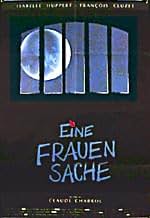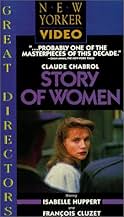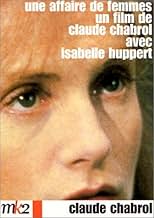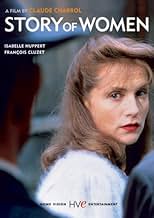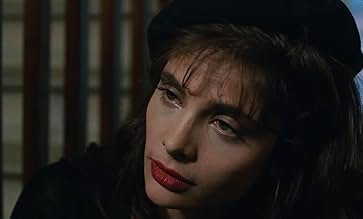IMDb रेटिंग
7.5/10
6.2 हज़ार
आपकी रेटिंग
नाज़ी के कब्जे वाले फ्रांस में, एक गृहिणी को, युद्ध में घायल अपने पति के घर लौटने पर, घर चलाने के लिए संघर्ष करना पड़ता है.नाज़ी के कब्जे वाले फ्रांस में, एक गृहिणी को, युद्ध में घायल अपने पति के घर लौटने पर, घर चलाने के लिए संघर्ष करना पड़ता है.नाज़ी के कब्जे वाले फ्रांस में, एक गृहिणी को, युद्ध में घायल अपने पति के घर लौटने पर, घर चलाने के लिए संघर्ष करना पड़ता है.
- पुरस्कार
- 14 जीत और कुल 8 नामांकन
फ़ीचर्ड समीक्षाएं
This is a true story and the heroine is not unlike Louis Malle's hero "Lacombe Lucien".They are too coarse,too immature to realize what they are doing.Lucien could have opted for the Resistance,but he's deemed too stupid by the schoolteacher and he winds up in Collaboration.Chabrol's heroine only wants to "help" her neighbors before she realizes she can earn a lot of dough with abortion.Chabrol watches his character as an entomologist,as she makes her way through those troubled times:the world has gone mad,and anyway is abortion worse than what the authorities are doing with the Jews ?Maréchal Petain's France was so humiliated that it tried to make up with it by focusing on "morality".
The heroine could make also think of Violette Nozières,another Chabrol movie which also featured Huppert.And she's also akin to Sandrine Bonnaire's character in "la cérémonie".All are women overtaken by events,all are victims of a well-meaning society,Chabrol's trademark. "Une affaire de femmes" is certainly a good work although it lacks the sweep and the directing innovations of his late sixties/early seventies classics.
The heroine could make also think of Violette Nozières,another Chabrol movie which also featured Huppert.And she's also akin to Sandrine Bonnaire's character in "la cérémonie".All are women overtaken by events,all are victims of a well-meaning society,Chabrol's trademark. "Une affaire de femmes" is certainly a good work although it lacks the sweep and the directing innovations of his late sixties/early seventies classics.
Though I had owned this on VHS (recorded off French TV), I only opted to check it out now – after acquiring the film in a version accompanied by English subtitles, on the occasion of its director's birthday. While not a typical effort (being a period melodrama and based on fact to boot), in retrospect, it is justly considered among Chabrol's finest.
Star Isabelle Huppert (in one of her best performances, playing an essentially unsympathetic if pitiable type) received the Best Actress award at the Venice Film Festival for her work here. Interestingly, I would 'meet' Chabrol there in 2004 where the winning film that year happened to deal with the exact same subject as STORY OF WOMEN – the controversy regarding the practice of abortion, i.e. Mike Leigh's VERA DRAKE! Co-star Francois Cluzet, who acts pretty much as second-fiddle to Huppert in this case, would eventually come into his own under Chabrol's guidance in the similarly excellent L'ENFER (1994). The film, however, also provides a notable showcase for Marie Trintignant in the role of Huppert's prostitute friend; again, the actress would subsequently be promoted to lead status for the same director's BETTY (1992), which I have just watched and reviewed.
STORY OF WOMEN, then, makes for compelling viewing in several different keys: as a character study (Huppert wants to be a singer, refuses to sleep with her ex-P.O.W. husband but then takes a much younger lover, of course offers her services to girls 'in trouble' and ultimately renounces her faith while in prison), as a look at war-torn France (though the Nazis are hardly ever in the foreground, the hardships endured by the locals obviously have a lot to do with how they are 'forced' to behave) and as a critique, in the vein of Costa-Gavras' movies, of the justice system (there is no doubt Huppert was at fault but the punishment meted out, to set an example and uphold the country's moral rectitude to counter the dishonor of occupation, was too extreme). Oddly enough, once the husband exposes her to the authorities for rather selfish reasons to begin with, he basically exits the picture and is never shown feeling any kind of remorse.
For the record, Chabrol had already treated a cause célèbre in VIOLETTE NOZIERE (1978; which I will get to soon in my ongoing marathon, since I am actually approaching it in reverse chronological order!) and would do so again in the recent A GIRL CUT IN TWO (2007; that I have already viewed and commented upon).
Star Isabelle Huppert (in one of her best performances, playing an essentially unsympathetic if pitiable type) received the Best Actress award at the Venice Film Festival for her work here. Interestingly, I would 'meet' Chabrol there in 2004 where the winning film that year happened to deal with the exact same subject as STORY OF WOMEN – the controversy regarding the practice of abortion, i.e. Mike Leigh's VERA DRAKE! Co-star Francois Cluzet, who acts pretty much as second-fiddle to Huppert in this case, would eventually come into his own under Chabrol's guidance in the similarly excellent L'ENFER (1994). The film, however, also provides a notable showcase for Marie Trintignant in the role of Huppert's prostitute friend; again, the actress would subsequently be promoted to lead status for the same director's BETTY (1992), which I have just watched and reviewed.
STORY OF WOMEN, then, makes for compelling viewing in several different keys: as a character study (Huppert wants to be a singer, refuses to sleep with her ex-P.O.W. husband but then takes a much younger lover, of course offers her services to girls 'in trouble' and ultimately renounces her faith while in prison), as a look at war-torn France (though the Nazis are hardly ever in the foreground, the hardships endured by the locals obviously have a lot to do with how they are 'forced' to behave) and as a critique, in the vein of Costa-Gavras' movies, of the justice system (there is no doubt Huppert was at fault but the punishment meted out, to set an example and uphold the country's moral rectitude to counter the dishonor of occupation, was too extreme). Oddly enough, once the husband exposes her to the authorities for rather selfish reasons to begin with, he basically exits the picture and is never shown feeling any kind of remorse.
For the record, Chabrol had already treated a cause célèbre in VIOLETTE NOZIERE (1978; which I will get to soon in my ongoing marathon, since I am actually approaching it in reverse chronological order!) and would do so again in the recent A GIRL CUT IN TWO (2007; that I have already viewed and commented upon).
This earns a high rating simply for the gritty, persuasive performance from it's star, Isabelle Huppert, who is called upon to be a mother and an abortionist, to be a lover and a murderer, to be a free spirit and a prisoner of Nazi tyranny; Huppert may never gain your sympathy, and doesn't play for it, but she should gain your understanding as she plays a true-to-life story of a woman severely punished by the French government for a woman's crime that the dominant culture can not countenance because of the political atmosphere at the time--all this, and it's a gripping story,too--but not at all a cheerer-upper.
When you have finished watching this film, you may find Huppert's character hasn't quite finished with you, an observant, quiet reminder of the consequences of our actions. Hers is a haunting performance.
When you have finished watching this film, you may find Huppert's character hasn't quite finished with you, an observant, quiet reminder of the consequences of our actions. Hers is a haunting performance.
Definitely one of director Claude Chabrol's best films, if not his best.
It is based upon a true story out of Nazi occupied France, and stars the incredible Isabelle Huppert (The Piano Teacher, 8 Women). She is supported by Marie Trintignant (Harrison's Flowers), who had her career cut short by an untimely death.
Huppert finds a way to feed her family. She performs abortions and rents out rooms to prostitutes. Everything seems to be going well for her, but her husband is not happy about the fact that he hasn't had any in 10 years, and she now has a lover - he turns her in.
France is now rid of the Germans and is trying to restore her morality. Unfortunately, Marie to be made an example.
Huppert was great, and Trintigant was also very good.
It is based upon a true story out of Nazi occupied France, and stars the incredible Isabelle Huppert (The Piano Teacher, 8 Women). She is supported by Marie Trintignant (Harrison's Flowers), who had her career cut short by an untimely death.
Huppert finds a way to feed her family. She performs abortions and rents out rooms to prostitutes. Everything seems to be going well for her, but her husband is not happy about the fact that he hasn't had any in 10 years, and she now has a lover - he turns her in.
France is now rid of the Germans and is trying to restore her morality. Unfortunately, Marie to be made an example.
Huppert was great, and Trintigant was also very good.
Marie (Isabelle Huppert) helps women have abortions in Nazi-occupied France, which turns out to be an unexpected income. However, she was arrested and sentenced to death by the time's reactionary government, looking for public examples to give to the nation.
Marie Latour (in reality her real name was Marie-Louise Giraud), was the last woman to be guillotined in France. The film tells this tragic story with dry realism, both in terms of the dialogues and the era's accurate reconstruction.
The film was in competion at the Italian 1988 Venice Film Festival. Isabelle Huppert won the Coppa Volpi award for best female interpretation, while outside conservative Catholic associations clamoured for the film to be withdrawn from distribution, for Marie's desperate prayer before being beheaded, accused by them fanatic groups to be 'blasphemous'. The film was released anyway.
Marie Latour (in reality her real name was Marie-Louise Giraud), was the last woman to be guillotined in France. The film tells this tragic story with dry realism, both in terms of the dialogues and the era's accurate reconstruction.
The film was in competion at the Italian 1988 Venice Film Festival. Isabelle Huppert won the Coppa Volpi award for best female interpretation, while outside conservative Catholic associations clamoured for the film to be withdrawn from distribution, for Marie's desperate prayer before being beheaded, accused by them fanatic groups to be 'blasphemous'. The film was released anyway.
क्या आपको पता है
- ट्रिवियाBased upon the true story of Marie-Louise Giraud, with character names changed.
- साउंडट्रैकLe Poème de l'Amour et de la Mer
Written by Ernest Chausson
टॉप पसंद
रेटिंग देने के लिए साइन-इन करें और वैयक्तिकृत सुझावों के लिए वॉचलिस्ट करें
- How long is Story of Women?Alexa द्वारा संचालित
विवरण
- रिलीज़ की तारीख़
- कंट्री ऑफ़ ओरिजिन
- आधिकारिक साइट
- भाषाएं
- इस रूप में भी जाना जाता है
- Une Affaire De Femmes
- फ़िल्माने की जगहें
- Coulommiers, Seine-et-Marne, फ़्रांस(interiors: women's prison)
- उत्पादन कंपनियां
- IMDbPro पर और कंपनी क्रेडिट देखें
बॉक्स ऑफ़िस
- US और कनाडा में सकल
- $4,38,483
- चलने की अवधि1 घंटा 48 मिनट
- ध्वनि मिश्रण
- पक्ष अनुपात
- 1.66 : 1
इस पेज में योगदान दें
किसी बदलाव का सुझाव दें या अनुपलब्ध कॉन्टेंट जोड़ें



